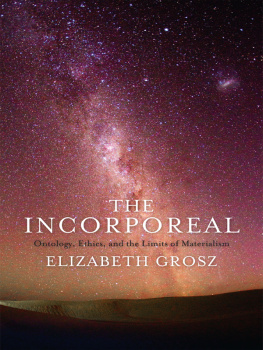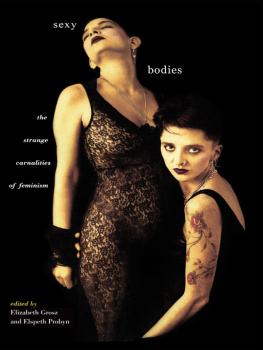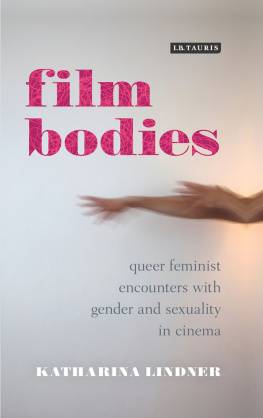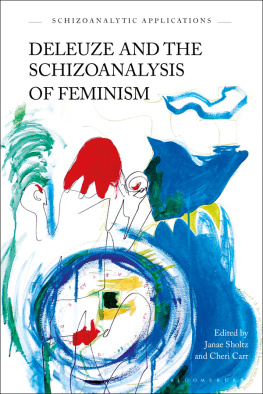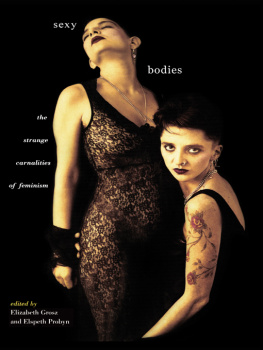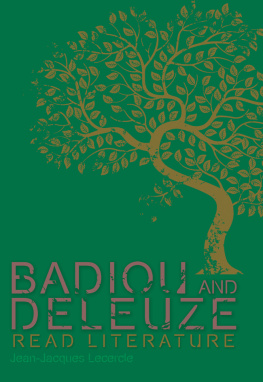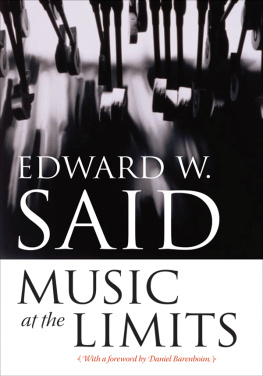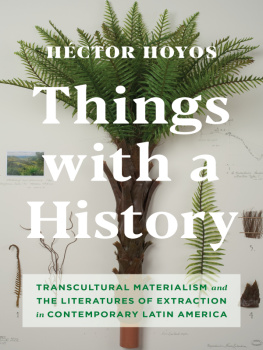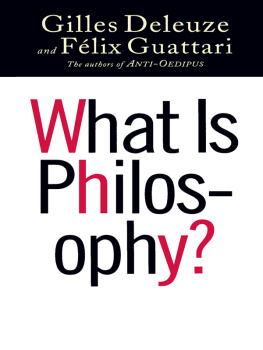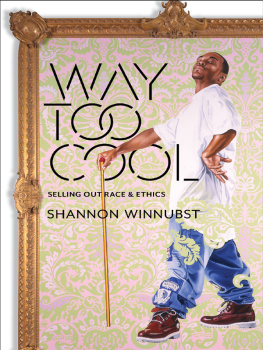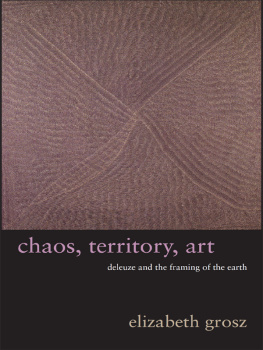Table of Contents
THE INCORPOREAL
THE INCORPOREAL
ONTOLOGY, ETHICS,
and the
LIMITS OF MATERIALISM
ELIZABETH GROSZ
Columbia University Press
New York

Columbia University Press
Publishers Since 1893
New York Chichester, West Sussex
cup.columbia.edu
Copyright 2017 Columbia University Press
All rights reserved
E-ISBN 978-0-231-54367-5
Library of Congress Cataloging-in-Publication Data
Names: Grosz, E. A. (Elizabeth A.) author.
Title: The incorporeal: ontology, ethics, and the limits of materialism / Elizabeth Grosz.
Description: New York: Columbia University Press, 2017. | Includes bibliographical references and index.
Identifiers: LCCN 2016041211| ISBN 9780231181624 (cloth: alk. paper) | ISBN 9780231543675 (e-book)
Subjects: LCSH: Materialism. | Idealism. | Ontology. | Ethics.
Classification: LCC B825 .G76 2017 | DDC 111dc23
LC record available at https://lccn.loc.gov/201604121
A Columbia University Press E-book.
CUP would be pleased to hear about your reading experience with this e-book at .
COVER PHOTO: John White Gettyimages
COVER DESIGN: Milenda Nan Ok Lee
BOOK DESIGN: Lisa Hamm
FOR MY PARENTS, WHO LIVE IN ETERNITY.
CONTENTS
My special thanks to a number of readers who have commented on chapters in their draft formKeith Ansell-Pearson, Ed Cohen, Annu Dahiya, Claus Halberg, Rebecca Hill, Philipa Rothfield, Kathy Rudy, Kristin Sampson, Hasana Sharp, and especially Nicole Fermon, as well as Wendy Lochner and Susan Pensak from Columbia University Press. This project has only been enhanced and improved through their comments and suggestions. I would also like to thank the Programs in Womens Studies and Literature at Duke University for providing a sustaining environment for the writing of this very abstract book, whose connections to both womens studies and literature remain tenuous at best.
Gilles Deleuze | LS | The Logic of Sense |
Gilles Deleuze | DR | Difference and Repetition |
Gilles Deleuze | PI | Pure Immanence: A Life |
Gilles Deleuze and Flix Guattari | ATP | A Thousand Plateaus |
Gilles Deleuze and Flix Guattari | WIP | What Is Philosophy? |
Friedrich Nietzsche | GS | The Gay Science |
Friedrich Nietzsche | EH | Ecce Homo |
Friedrich Nietzsche | TI | Twilight of the Idols |
Friedrich Nietzsche | WP | The Will to Power |
Friedrich Nietzsche | Z | Thus Spoke Zarathustra |
Benedict de Spinoza | E | Ethics |
Gilbert Simondon | IGPB | Lindividu et sa gense physico-biologique |
Gilbert Simondon | ILFI | Lindividuation la lumire des notions de forme et dinformation |
Gilbert Simondon | IPC | Lindividuation psychique et collective |
Gilbert Simondon | METO | On the Mode of Existence of Technical Objects |
Gilbert Simondon | PPO | The Position of the Problem of Ontogenesis |
T his is a book on ethics, although it never addresses morality, the question of what is to be done. It is also a book on ontology, the substance, structure, and forms of the world, this one world in which we live and that we share with all forms of life, although it rarely addresses being as such. I aim to develop an ontoethics, a way of thinking about not just how the world is but how it could be, how it is open to change, and, above all, the becomings it may undergo. In this sense, an ethics always passes into and cannot be readily separated from a politics, which addresses social, collective, cultural, and economic life and their possibilities for change. An ontoethics involves an ethics that addresses not just human life in its interhuman relations, but relations between the human and an entire world, both organic and inorganic. Insofar as we create ontologies that reflect not only, or primarily, beings but also becomings, that is, insofar as ontologies can be considered ontogeneses, an ontoethics cannot but address the question of how to act in the present and, primarily, how to bring about a future different from the present. This question is simultaneously ontological, ethical, and political; it may require new forms of technology and new kinds of art to prepare for and accompany the transformations of a present that is never fully present, composed of beings existing in their self-identity, always divided and complicated by the becomings that characterize and continually transform them.
The open-ended nature of the future, its capacity to deviate from the present and its forms of domination and normalization, necessarily link an ethics, how one is to live, with a politics, how collectives, and their constituents, are to live and act together and within what protective and limiting parameters. An ethics does not form a politics in itself, though it is a necessary ingredient in the organization and operation of political collectives or movements, those established with a specific project or aim in social life. It is even more unusual that an ethics or politics consider itself in connection with an ontology, an account of what constitutes the real, what exists in this world that we collectively share with all forms of life. Only rarely has ethics been considered a first philosophy, a philosophy logically prior to an ontology (this project has been limited, for over a century, to the writings of Emmanuel Levinas); more commonly, ethics has been reduced to a morality, which I understand as a set of principles, a list of preferred practices, with generalizable or even universalizable criteria of virtue or goodness, by which we should all act and through which we are capable of providing judgments about moral or immoral activities. It is only rarely that ontology is addressed not only in terms of what is but also in terms of how what is may enable what might be. Ontology has been increasingly directed toward explaining scientific and mathematical models, for which ethical considerations seem conceptually extrinsic. Yet an ontology entails a consideration of the future, not only of what we can guarantee or be certain but above all what virtualities in the present may enable in the future. This is the possibility of the future being otherwise than the present, the openness of a future which is nevertheless tied to, based on but not entirely limited by, the past and present. Such considerations of the future are the concerns of precisely ethics and politics and are the implicationsopen to heated and frequent dispute, no doubtof whatever one commits to as an ontology.

